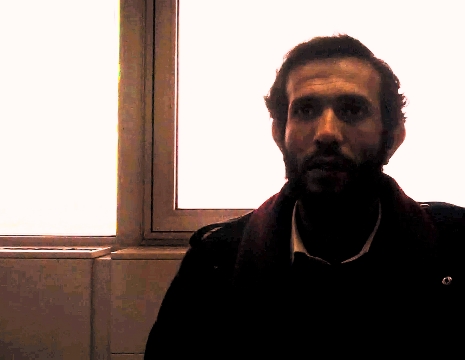Revolutionary Socialists boycotted elections to avoid isolation from people (Video attached)

Set to participate in parliamentary elections, the Revolutionary Socialists were forced to back down after the violent clashes of Mohamed Mahmoud took place, as not to lose touch with the people, said Haitham Mohammadein, official spokesperson of the movement.
As a wave of uprisings preceding the elections was spread over ten different governorates, witnessing the participation of millions and leading to deaths and injuries, it was only natural for the movement to back down, Mohammadein explained in his interview with Aswat Masriya.
“Participating in the elections at that critical moment would have isolated us from the streets,” said Mohammadein, adding that the movement also boycotted the process in protest against the proceeding of elections under military-rule.
Mohammadein said that before the elections, the movement had anticipated a high turnout, hoping that the first post-revolution parliament would be elected democratically and with transparency (without remnants of the old regime).
"Our position was, we are where the people are." he said.
Established in the early 90’s, the Revolutionary Socialists movement believes that Egypt’s ruling military, known as the Supreme Council of the Armed Forces (SCAF), has hijacked the revolution in an attempt to maintain the old system while merely remodeling it.
Mohammadein said that the Revolutionary Socialists’ vision for change has remained the same since the establishment of the movement; popular uprising as the foundation to lead to change, with a revolutionary authority consisted of student movements, popular committees and workers unions, as an alternative ruler for the nation.
“We believe in direct democracy where the people could gain control over Egypt’s power and wealth through direct and transparent elections, nationwide.” Mohammadein insisted.
Many observers view the Revolutionary Socialists as a radical leftist movement, but despite their small size, they have succeeded to find room within the political sphere.
“In the 90’s, our approach was viewed as radical or even insane as we called for a popular uprising to overthrow the authoritarian Mubarak regime but we held onto our principles which were based on political analyses.” Mohammadein went on to explain.
Tension erupted weeks earlier when one of the movement’s leaders called for young soldiers to join the revolution, indicating that breakdown within the army must take place.
Mohammadein also told Aswat Masriya that the unjust and authoritarian regime that is devastating the nation needs to be brought down and replaced with an alternative revolutionary regime based on freedom and social justice.
He insisted however that Revolutionary Socialists do not believe in the burning down of institutions as a way to topple the regime, but instead believe that those in charge need to be removed in order for the regime to fall.
Indicating that revolting is not a new concept for Egyptians, Mohammadein stressed on how the masses brought down the widely-despised State Security system which was used as a tool to subdue and suppress the people during the Mubarak era.
Mohammadein pointed out that a number of policemen and soldiers participated in the revolution, “We all saw scenes of security forces sympathizing and participating with the people in Tahrir”, he said.
Commenting on the opposition figures in the parliament, Mohammadein believes that “real authority” must be outside the walls of parliament, and within the reach of the people.
“Real authority is the complete control of the people over their institutions; all institutions must be under democratic supervision and observation of the people. This will not be achieved under the power imbalance that is caused by the ruling military, which has hands in the economic sector, is a big player in international affairs and is practically ruling the country behind the scenes and controlling the parliament.”
Mohammadein insisted that the SCAF is ruling behind the scenes, while the parliament, Egypt’s only elected authority, is unable to challenge it on key issues.
"The latest events has shown that the military council has failed to fulfill the most basic of the revolution’s demands, which confirms to us that if the SCAF does not step down, fully and not just superficially, no change will ever occur and the old regime will be reshaped and put back into place," Mohammadein said.
He added that the Islamic-current has become against the revolution to protect the power they have gained through the parliament.
Commenting on the recent strikes led by workers and government employees, Mohammadein said that when the authorities ask to be given a chance or more time, they are practically asking for another chance to put the old regime back in order.
"If authorities want protests to stop, they must work on fulfilling the demands of the people" he said.









facebook comments